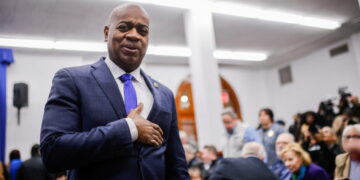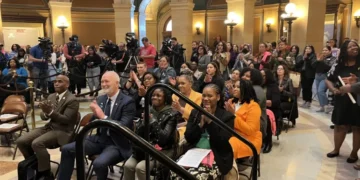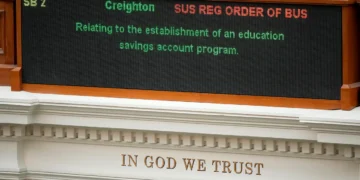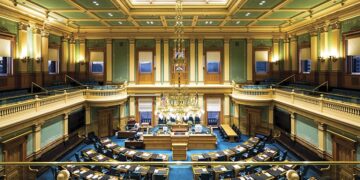Nov 29 2024 Story by: Editor
A state judge in Newburgh, N.Y., approximately 60 miles from New York City, has declared a prominent voting rights law unconstitutional. The John R. Lewis Voting Rights Act of New York (NYVRA), enacted in 2022, was sponsored by Senator Zellnor Myrie and signed by Governor Kathy Hochul. The law aimed to safeguard the voting rights of individuals in protected classes and required pre approval for certain voting policies.
“When New York enacted the strongest voting rights law in the country, we knew there would be challenges,” Senator Myrie stated. “I disagree with the court’s legal reasoning and expect this decision will be overturned on appeal.”
The case stemmed from a lawsuit filed in March by six Black and Hispanic voters from Newburgh against the town’s electoral board. This lawsuit, one of at least four filed under the NYVRA, challenged the town’s “at-large elections” process, which the plaintiffs argued disadvantaged Black and Hispanic residents by preventing them from electing their preferred candidates. They called for a shift to a “by district” voting system, according to the Associated Press (AP).
On Nov. 8, Judge Maria Vazquez-Doles ruled against the plaintiffs, striking down both their suit and the NYVRA. She deemed the law “unconstitutional,” asserting that it was “based on race and ethnicity.” Vazquez-Doles referenced similar reasoning used by the U.S. Supreme Court when it invalidated affirmative action programs in higher education, citing the equal protection clause.
The judge’s opinion criticized the NYVRA for not requiring voters to prove past discrimination or clearly defining the threshold for determining when a group’s voting power had been diluted, the AP reported.
Michael Pernick, political participation counsel for the Legal Defense Fund (LDF), emphasized the necessity of the voting rights act in cases like this.
“The bill defines protected classes as race, color, and language minority groups. It’s consistent with the federal voting rights act,” said Pernick. “Here’s what’s important: The statute is what is called race-neutral. It doesn’t specifically say Black voters, or Latino voters, or White voters. Any members of a group that’s facing discrimination can use these protections.”
Pernick strongly criticized Vazquez-Doles’s decision, describing it as relying on the “wrong legal framework” and mischaracterizing the state law.
Assemblywoman Latrice Walker, who sponsored the bill in the State Assembly, also expressed optimism that the ruling would be overturned.
“The John R. Lewis Voting Rights Act of New York delivered the most comprehensive set of voter protections of any state in America,” Walker said. “I am confident that the judge’s decision will be overturned on appeal. I believe wholeheartedly that the right to vote is the very cornerstone of our democracy. We must not only exercise that right, but we also must do everything in our power to protect it.”
On Nov. 11, the plaintiffs formally appealed the ruling.
“Governor Hochul was proud to sign the John R. Lewis Voting Rights Act into law in 2022, strengthening voting rights and celebrating the legacy of her late colleague Congressman John Lewis,” a spokesperson for Hochul affirmed. Source: Amsterdam News

















